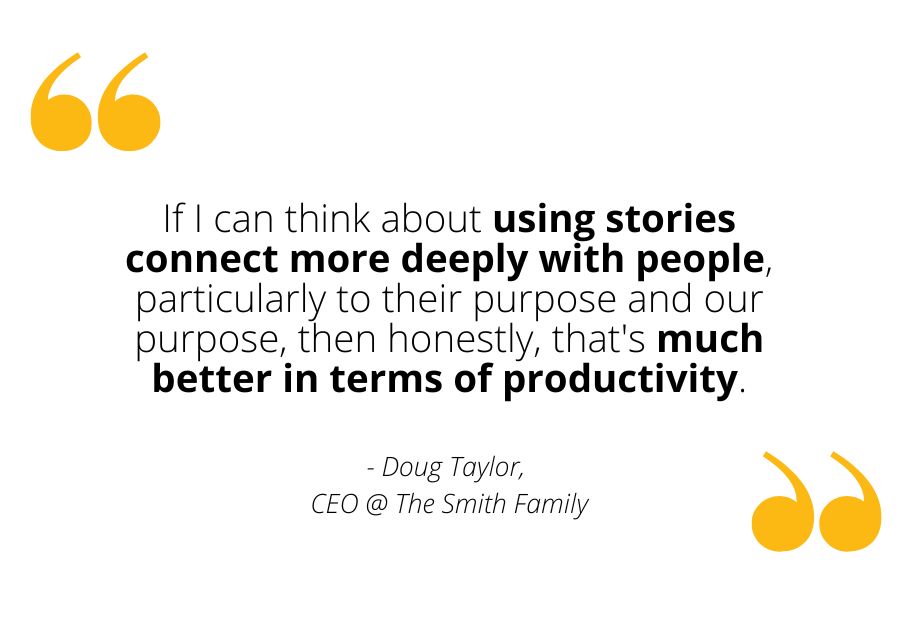Today we’re exploring the question, why should CEOs tell stories on social media? Yes, stories. I wonder how many leaders see storytelling as part of their official remit today?
Some may think, well, why bother? My job is to manage the numbers and the decision making across the organisation, not tell stories. And that may well have been true just a few short decades ago. But we now live in the reputation economy, where leaders are required to do much more than just deliver shareholder returns.
Just as social media has provided leaders with a platform to speak and control their narrative, social media has also provided their stakeholders with access and the right of reply. When audiences are making decisions around whether to or not to work for you, to or not to buy from you, to or not to trust you, your stories as a CEO really do matter.
And for that reason, I’m thrilled to be joined by Doug Taylor, who is the CEO of the Smith family and an unofficial Chief Storyteller too. Thank you so much for joining the Your Digital Reputation podcast. Tune in, take a read below and be sure to subscribe to the newsletter too so you don’t miss a beat.

Roger Christie: Doug, your official title is ‘Chief Executive Officer’, but I mentioned maybe one more tongue in cheek, which is this idea of a Chief Storyteller too. It’s a phrase you mentioned in another interview and it really stuck with me. This idea of a Chief Storyteller and a Chief Executive Officer, those dual responsibilities – they have quite an impact when you consider those two things together. So perhaps in your words and from your experience, what is a Chief Storyteller and how important is that as part of your role at The Smith Family?
Doug Taylor: It’s a great question. And by saying I’m ‘Chief Storyteller’, it doesn’t mean that I’m the only one that does it. There are others and arguably they do it much better than I do. But, fundamentally, from my perspective, if you look at the history of humanity, stories are how we convey meaning and purpose. If you look at that over generations from time immemorial, that’s been how we transit those really important things through generations and across different groups in the community. We all do it. We have an individual story. We have a family story. We have a national story but we don’t pay enough attention to our organisational story.
That’s really what I see my role as: helping our team understand and be absolutely focused on our story. And from my perspective, that helps our culture in terms of how we understand who we are, what we’re about and how we do things around here.
If I can think about using stories to connect more deeply with people, particularly to their purpose and our purpose, then honestly, that’s much better in terms of productivity. People are more engaged, they’re more attuned and they want to contribute more to our organisation, both our team members, but also our donors and our volunteers and our supporters.

Roger Christie: What I’m hearing is you’re a stories rich organisation. … Is this a role and a responsibility for every CEO? Or is this something that applies more specifically for The Smith Family, for other NGOs? Where do you see that responsibility today?
Doug Taylor: I think the lines have blurred between NFPs, business and government. You think about the rise of ESG – we have as citizens and as employees different expectations of our institutions and I think a lot of that means that we want them to be fundamentally speaking to their purpose and their responsibility to execute in line with that purpose and mission. So, that’s why I think stories are a vehicle for conveying that fundamental purpose of any institution in society and that makes it really critical. I think about the Simon Sinek quote, “People don’t buy what you do, they buy why you do it.”
Stories about purpose, take you to the ‘why’. I think any institution has a responsibility to do that. And I see great corporate leaders doing that. I see the best of our political leaders also finding ways to tap into those stories and to really bring those kind of factors to the fore. And that’s what I see as fundamentally my role and the best of any leader in any organisation doing that as well.
Roger Christie: I think the perception for storytelling is around ‘what I say’. It’s making sure that I’m crafting that message perfectly and getting it out there where it can be heard. And success in that process starts with listening. Social media is exactly the same. I think there is an overemphasis on the broadcast, the talking, and at times arguably yelling. If we actually step back and listen better as leaders, we read the room better. We understand the needs of stakeholders better, and then therefore anything we say is going to be more suited to their needs, more relevant to them and ideally going to resonate more. If it’s got a storytelling vehicle behind it, then that’s what’s really going to make it sing.
Doug Taylor: Absolutely. And in fact, just further to that, I think Roger the beauty of social media and other digital engagement is that you actually go from story to listening to conversation. The back and forward. I think as a leader, [social media] is where we want to be in conversation – with our people and our communities. Because we know that our ideas get sharp and refined, edges get knocked off and we’re exposed to more diversity of thinking, which only makes our ideas, our strategy and our visions better. That’s the great power of social media in many ways.
Roger Christie: You’ve raised a couple of thoughts around the importance of listening to inform what you say in your storytelling. I came into this conversation thinking I was going to say to leaders, there is a message around being courageous – don’t be afraid to speak up and share your stories.
But I think it’s actually more nuanced than that. I think it’s being courageous about listening first. It’s being courageous about not seeing yourself as the owner and source of all stories. And it’s being courageous about perhaps extending some of your equity as the most senior person potentially in the room to others and actually donating that, if I can use that word, leasing some of that equity and that reputation to others so that they can tell their stories.
So for people who might be avoiding sharing stories, why should they? And why should they rethink that for social media?
Doug Taylor: It’s interesting. Look, I’m not a natural storyteller. It’s a learnt skill because I’ve seen the power of it in terms of really helping people understand what you’re trying to convey and being bought into the mission and the purpose of the organisation. And I think, you summed it up really well, better than me. I do think there’s an element of courage in taking some first steps and small steps in this regard.
One of the things that I’ve found helpful in storytelling is actually sometimes putting me in the story – actually talking about me and what I’m about. Now for some people, they may be quite averse to that, thinking, “It’s not all about me.” Well, no, it’s not. But sometimes I say, if this is going to help me convey this really important issue, then I think that’s what matters and what’s important.
As an example of that, I was just doing a tour meeting team members. And look, it’s really tough at the moment for The Smith Family team members who are working with families with really challenging circumstances. They’re struggling. So I told a story about my first role working with rough sleepers in the inner city of Sydney and how challenging that was for me. It was in the nineties, the peak of a heroin epidemic. I talked about what I learnt from that experience about resilience and keeping on through really challenging times now. I wouldn’t always put myself in the story, but sometimes it’s really powerful and I think helps people connect with what you’re trying to convey.
That might be a bridge too far but I think, I would just say to others thinking about where to start with stories is – start anywhere. Don’t overthink it. Use other people’s stories – there’s plenty of things online now you can make your own and that conveys really powerful things over and above the facts and the figures and the theories and the strategies. Stories do just take people’s brain into a different space.
The amount of times that I see and hear people replay back to me what they’ve heard, it’s always about the stories I’ve shared. It’s not the theoretical stuff that comes with it, but the story attached to it. It just connects with people. It’s worth having a go and taking some small steps. You know, what’s the worst that could happen? People will see you trying, attempting and they’ll want to encourage that and they’ll want the best from you in that regard.
A lot of this I think comes down to how you think about leadership. There’s I think the ‘traditional modes of leadership’ person in the corner office sending out missives every now and then, and everyone receiving those messages on high. But I think our understanding of leadership has changed from not being a role, but being an activity – something that anyone can effectively do.
And, I think from my perspective and why I try to do things online in the organisation and externally is because I want to be engaging with other leaders and learning from them. I want to be in those sorts of conversations where we can be growing together and through that, my story, my messages, what I’m trying to achieve gets across and I think it connects much more deeply.

To learn more about and support the work of The Smith Family, head to: www.thesmithfamily.com.au
Feel free to drop Roger Christie a note with any thoughts from this conversation. If you want more on all things digital reputation, be sure to subscribe below to the Your Digital Reputation newsletter packed full of advice, trends and the best leadership examples just for you.




